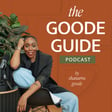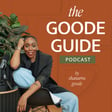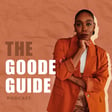
“Healing Your Money Story” with Kara Stevens, Founder of The Frugal Feminista
In this episode Shanarra sits down with finance educator Kara Stevens to get under the surface. Kara pulls back the curtain on how childhood scripts, corporate pressure, and that “treat-yourself” mentality keep high-achieving women stuck in fear or guilt—even when the paycheck looks great. Together, we unpack why healing comes before spreadsheets, how to build a wardrobe and a nest egg you love, and the step-by-step plan Kara used to fund a dream move to Ghana. Grab your headphones and a journal; this one’s part money master-class, part therapy session.
Timestamped Guide
Time
Topic
00:00 Welcome back to The Goode Guide—why money makes even confident women squirm
01:35 Meet Kara Stevens & the origin of The Frugal Feminista
04:45 College debt, default notices, and Kara’s library epiphany
08:20 When the numbers look good but anxiety still screams—healing vs. hustling
12:40 Shanarra gets vulnerable: generational money fears & “reward” spending
18:05 The confidence closet: success pressure, designer bags, and diminishing returns
23:30 Budgeting that doesn’t feel like punishment—track ➜ bucket ➜ pay yourself first
29:10 Sinking funds, thrift magic, and Rent-the-Runway hacks
32:55 Funding big dreams: how Kara de-risked a leap from NYC to Ghana
37:40 Coaching women leaders: uncoupling worth from consumption
41:30 Advice to 20-something Kara—“Take more risks. Don’t forsake today for a maybe tomorrow.”
44:50 Quick-fire listener Q’s: budgeting solo, partner money dates, travel funds
47:15 Free tools: Kara’s “Break Up With Broke-ness” kit & 5-Day Financial Reset
48:10 Where to find Kara
Resources & Links
- Kara’s site & freebies: https://www.thefrugalfeminista.com/
- Instagram: @frugalfeminista ihttps://www.instagram.com/frugalfeminista
- Linkedin: https://www.linkedin.com/in/kara-stevens-edm-37882b12/
- Facebook: https://www.facebook.com/thefrugalfeminista
Break Up With Broke-ness Kit: Download inside Kara’s community hub.


